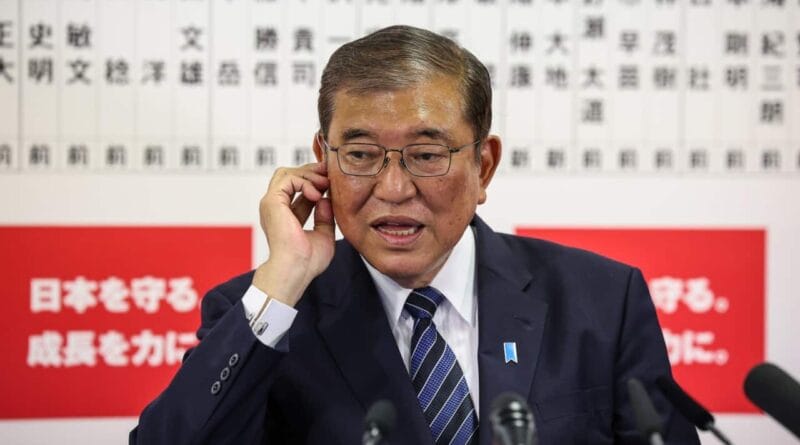Japan’s ruling coalition is set to lose its parliamentary majority, exit polls suggest, raising uncertainty over the make-up of the government of the world’s fourth-largest economy.
A poll by Nippon TV showed Prime Minister Shigeru Ishiba’s Liberal Democratic Party (LDP), which has ruled Japan for almost all of its post-war history, and junior coalition partner Komeito would get 198 of the 465 seats in the lower house of Japan’s parliament.
That is well short of the 233 needed to maintain its majority and would be its worst election result since the coalition briefly lost power in 2009.
The biggest winner of the night, the main opposition Constitutional Democratic Party of Japan (CDPJ), was predicted to win 157, as voters punished Ishiba’s party over a funding scandal and inflation.
The outcome may force parties into fractious power-sharing deals to rule, potentially ushering in political instability as the country faces economic headwinds and an increasingly tense security environment in East Asia.
The election comes nine days before voters in the United States — Japan’s closest ally — head to the polls in another unpredictable ballot.
“This election has been very tough for us,” Ishiba told TV Tokyo, with about 40 per cent of seats still to be declared.
He said he would wait until the final results, likely due in the early hours of Monday, before considering potential coalitions or other power-sharing deals.
A poll by public broadcaster NHK predicted his coalition would win between 174 and 254 seats, and the CDPJ 128 to 191 seats.
The election was called by new LDP leader Shigeru Ishiba just three days after his selection, before he was officially sworn in as prime minister. Source: AP / Hiro Komae
Ishiba called the snap poll immediately after being , hoping to win a public mandate for his premiership. His predecessor, Fumio Kishida, quit after his support cratered due to anger over a cost of living crunch and the scandal involving unrecorded donations to MPs.
The LDP has held an outright majority since it returned to power in 2012 after a brief spell of opposition rule. It also lost power briefly in 1993, when a coalition of seven opposition parties formed a government that lasted less than a year.
Japanese stocks and the yen are expected to fall while longer-dated government bond yields are seen rising as investors react to the uncertainty.
“The voters’ judgement on the ruling bloc was harsher than expected,” said Saisuke Sakai, senior economist at Mizuho Research and Technologies.
“Uncertainty over the administration’s continuity has increased, and the stock market is likely to react tomorrow with a sell-off, especially among foreign investors.”
The exit polls suggest smaller parties, such as the Democratic Party for the People (DPP) or the Japan Innovation Party, could prove key to forming a government.






